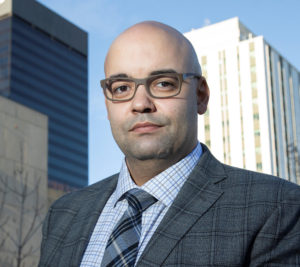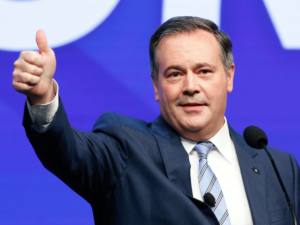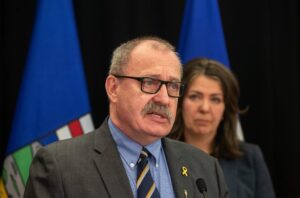On 6 May, Professor Jared Wesley wrote a piece in The Tyee about the dangers of creeping authoritarianism in Alberta. I reached out to Wesley last week to invite him to chat with me about this threat. We talked on Thursday 16 May. What I particularly liked about his online piece was both warning of the dangers of creeping authoritarianism and the need for citizens to raise their voices about questionable overreach by the provincial government in number of areas discussed in the interview.
In “Why the UCP is a Threat to Democracy“ Professor Wesley lists four key traits or pillar values of democratic societies – 1. Rule of law; 2. Checks and Balances; 3. Electoral integrity; and 4. Distribution of power. He then proceeds to define key attributes of these pillars and where these values or democratic norms have been invalidated.
You can go to the interview at Youtube here. See below for the transcript.
Transcript interview with Jared Wesley 16-5-21024
Dr. Wesley began by discussing his research which is trying to understand the conflicting views that Alberta is conservative or progressive. In fact, 80 per cent of Albertans are progressive and conservative. This explains why the progressive Conservative Association of Alberta remained in power for 44 years.
This stability of government and political leadership has given way to considerable turnover in the premier office with seven premiers in the past 15 years, an unheard-of turnover of leaders in Alberta’s relatively short political history. The tranquility was formally shattered in 2015 when the New Democrats defeated a divided Progressive Conservative party. The rift between Wildrose and the PCs was subsequently healed over with the emergence of the United Conservative Party in 2017 and its decisive electoral victory in 2019. But within 3 years of taking office, Kenney’s leadership was assailed by elements of the far right of the party leading to Ms. Smith victory with the assistance of Take Back Alberta (TBA).

While Professor Wesley had concerns about the authoritarian bent of Kenney (e.g., firing the Election Commissioner and devolving powers to Cabinet during COVID), now he has chosen to speak out on the threat to Alberta democracy as more evidence piles up about the UCP’s disregard for basic democratic checks and balances. It is when a series of actions, not one-offs, which inhibit public input into government decision-making and policy-making, keep piling up to form a pattern, that has motivated Wesley to speak out about risks to Alberta’s democratic institutions.
But the UCP has changed my mind and I got asked before in another conversation- “What’s the role of a political scientist?….. but it’s become an obligation for those of us that are trained in looking at what conservatism is. What are the boundaries of democracy? What is “politics is usual” versus drifting towards authoritarianism and especially with Bills 18 and 20 but not starting with them, I’ve see it as part of my role to ask questions and to tell folks what are the implications if we continue down this road … I do want to make it absolutely clear while I do think that the UCP is an authoritarian force, in Alberta, I’m not suggesting that Alberta is a totalitarian state or that the UCP is a Putinesque organization. … I believe that democracy and authoritarianism are at opposite ends of the spectrum. And Albertans have to decide how far down the authoritarian side of the spectrum we want to go and one of the things I keep reminding folks eventually if you go too far down you don’t get a choice to go back. And while I don’t think we’re quite at that point, we are at a pivotal moment. We have to ask ourselves- “What do we want out of this democracy?”
Election Integrity
There are at least two main concerns around electoral integrity. The first is the trend in electioneering promises. As we saw in 2023, a number of unpopular UCP ideas were not talked about leaving electors with an understanding that these policies, like a provincial police force or an Alberta Pension Plan, had been shelved only to be resurrected after the election.
That politicians say anything or do anything they can to get elected and they’re not above lying. That’s a problem. And that’s easily solved but to your point about trust in the electoral process. We don’t want to end up in a situation like they have in the United States where we’ve seen the erosion of principal called “loser’s consent.” A lot of people don’t realize that elections are really based on the honor system in Canada. We all agree that when votes are counted on election night or the day after that that the loser will concede and wish the victor the best on behalf of the community and we all move on. We’ve seen it in the States that that is something we shouldn’t take for granted.
The second issue concerns the machinery of running elections. Much of conversation revolved around amendments to the Local Authorities Elections Act contained in Bill 20, inconspicuously labelled the Municipal Affairs Statues Amendment Act , 2024. Particularly worrisome for Wesley was not the red herring of vote tabulators but the pernicious nature of proposed changes to the system of vouching and voter registration. These changes, not spoken of during the election, reflect right-wing, conspiracy fears about widespread voter fraud have been groundless.

With Bill 20 they have done away with vouching as a means of providing your identify or verifying your identity to vote. And for folks that aren’t familiar, this is a process where you find somebody who has proper identification to go to the polling station with you and tell the person at the door who taking the register, “I believe this person is who they say they are and they are eligible to vote.” It’s worked in Canadian elections for decades. We have in Alberta only seven cases of voter fraud over the last decade all of them were caught, involving five people and none of them involving the process of vouching. This process works and over a hundred thousand Albertans have used vouching at one point or another in their lives, either they’ve been vouched for or they’ve done the vouching. It’s 8% of the electorate.
Elimination of dissent
Key for democratic institutions is the checks and balances in systems such as an independent judiciary and prosecutorial system, and the distribution of powers. Recently the post of Ethics Commissioner, held by former Justice Marguerite Trussler, has been filled by a candidate for a UCP nomination and former deputy minister appointed by the UCP. The new appointment was strongly opposed by the opposition NDP but the Committee’s majority of UCP members, confirmed the appointment. Another position being recruited for is the Chief Electoral Officer, who is expected to conduct elections in a nonpartisan fashion. And while patronage is “politics as usual” and common for other government boards and commissions, partisan appointments to t legislative offices are not.
while patronage appointments to some of these agencies boards and commissions has been around in Canada for years we can debate whether that’s a good thing or a bad thing, but it’s when these appointments happen as a means of trying to shut down dissent or to shut down checks and balances on the government’s power that we have a real problem. And I’d argue that there is actually a pattern of this happening in Alberta starting with the firing of an election commissioner in the middle of an investigation into the premier’s leadership campaign. That doesn’t pass the smell test.
Dissension in ranks after Trudeau gone?
While Smith has seemed to calm dissent within the party, with the strong possibility that the Trudeau Liberals will be defeated in the next federal election, who can the UCP fight against- Pierre Poilievre?. Professor Wesley noted that there are at least three conservative parties that may be registered in Edmonton. Take Back Alberta’s (TBA) leadership is contestable and many right wing Albertans disavow the TBA faction.
Historically conservatives have turned on each other more than they’ve turned on other forces, which is why the United Conservative Party formed in the first place because the Wild Rose and PCs were at each other’s throats. So, I’d be interested what happens in the next year and a half or so leading up some municipal elections see whether this actually fractures that movement.
Advice to the new NDP Leader
Staying with the theme of democratic backsliding, I asked Wesley what advice would he give to the new NDP leader to redefine the relationship between voters and their governments. He suggested that the party reach out to the “unusual suspects” persons especially in rural areas questioning “whether the provincial cabinet for example should be allowed to remove elected politicians from local councils or to overturn bylaws that they support in and so it’s freed up a lot of, as you put it, democrats.”
People who believe in the democratic process and conservatives historically in this province have been big champions of that. And if there’s a way for the NDP to avoid the kind of factionalistic, progressive versus conservative discussion and start talking as they already have if you look at their messaging.
In a subsequent post I examine another problem facing Alberta democracy by exploring the performative role of the Public Accounts Committee.